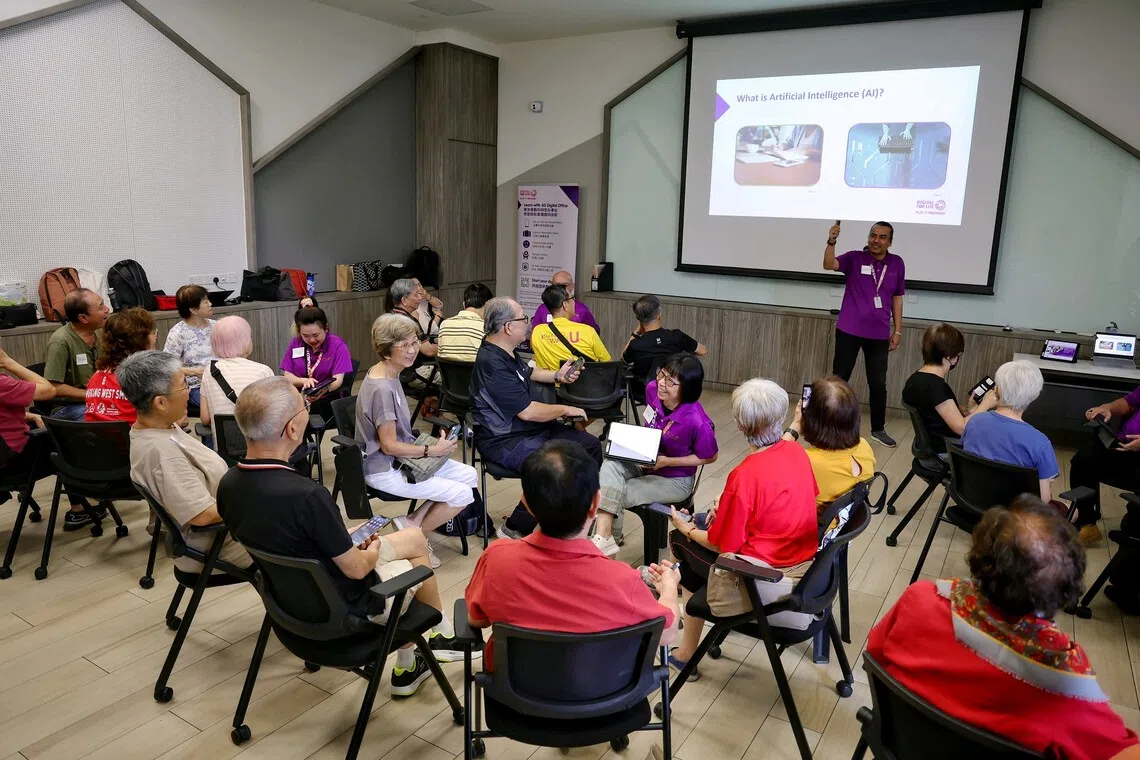Digital inclusivity a shared responsibility: Rahayu Mahzam
Sign up now: Get ST's newsletters delivered to your inbox

The authorities have a “longstanding commitment” to support seniors and low-income families in their digitalisation journey, said Minister of State for Digital Development and Information Rahayu Mahzam.
ST PHOTO: KEVIN LIM
SINGAPORE – Building an inclusive digital society is a shared responsibility for all, said Minister of State for Digital Development and Information Rahayu Mahzam.
While community partners can help support digital parenting, companies and agencies can adopt accessible digital design practices, she said in Parliament on Sept 25.
And as individuals, people can help neighbours and family members pick up new digital skills or set examples for positive use of technology for children, she said during the debate on the President’s Address.
“Today, digital technology has already woven itself into almost every aspect of life. We access digital government services, use the internet for school and work, shop online at our convenience and connect with loved ones through messaging apps and social media,” said Ms Rahayu.
This, however, comes with both opportunities and challenges, she added.
In addition to misinformation and disinformation, there has been a “troubling rise” in online harms, she noted, pointing to a poll conducted by the Ministry of Digital Development and Information (MDDI) in 2024 which found that more than 70 per cent of respondents had encountered harmful online content such as cyber bullying.
“To better protect Singaporeans from online harms, we have been strengthening our regulatory tools,” she said.
She pointed to amendments to the Broadcasting Act, which gives the Infocomm Media Development Authority the legal powers to issue directions to prevent users in Singapore from accessing harmful content on social media services and app stores.
Ms Rahayu added that a dedicated government agency, the Online Safety Commission,
The authorities will continue to review legislation and build the necessary regulatory safeguards, studying the approaches taken in countries like Britain and Australia, including the introduction of age verification measures in such places.
“We want to put in place effective legislation that can protect our children from harmful and inappropriate content online,” she said, noting that the authorities are engaging social media platforms, think-tanks and technology vendors to better understand the online space.
While parents are doing their best to guide their children’s digital use, many lack the confidence to do so, Ms Rahayu said, citing findings from MDDI’s Digital Parenting Survey
Beyond stronger legislation, parents want access to resources such as online courses and guides to help them manage their child’s digital activities, she added.
To that end, the Government has produced guides on screen use, positive uses of technology and social media as well as resources addressing matters such as cyber bullying, said Ms Rahayu, who is also Minister of State for Health.
However, creating a positive online culture is not just about parents and children, she said.
Encouraging everyone to be kind in their digital interactions, Ms Rahayu suggested people could pause and think before sharing posts that could be hurtful, or report cases of cyber bullying instead of just scrolling past them.
“These might feel like small gestures, but they will shape the digital culture we are all part of,” she said.
To improve digital inclusion, the authorities have a “longstanding commitment” to support seniors and low-income families in their digitalisation journey, Ms Rahayu said.
Programmes that subsidise internet access and devices have benefited more than 20,000 households since 2023, while since 2020, digital ambassadors from the SG Digital Office have helped more than 400,000 seniors with skills such as accessing government services like Singpass and health services.
As a result, more seniors are going online, with 72 per cent of them able to find information online, up from 53 per cent in 2020, she noted.
Programmes at the SG Digital Office help address the concerns of seniors such as the fear of being scammed online, as well as teaching them how to recognise suspicious links, Ms Rahayu said.
“It is inspiring to watch them overcome their fears, adopt a positive attitude and embrace new digital technologies,” she said.
For those unable to go fully digital, alternatives such as physical CDC vouchers and in-person assistance for digital government transactions are provided, she said.
“We encourage digital first but will not be digital only. We will continue to help citizens access government services through whatever means they prefer,” she said.
To make government digital services more accessible and easier to use, the Digital Service Standards has been updated. Citizens are also involved in improving the user experience for digital government services through initiatives such as the Tech Kaki community, she said.
“Our hope is that whether it is applying for housing, booking a doctor’s appointment or seeking social support services, the experience should be smooth and reassuring for all users,” said Ms Rahayu.
“Accessible digital design is about more than just lines of code. It represents our shared commitment to building an equitable, thriving environment where everyone can take part confidently and with ease.”



